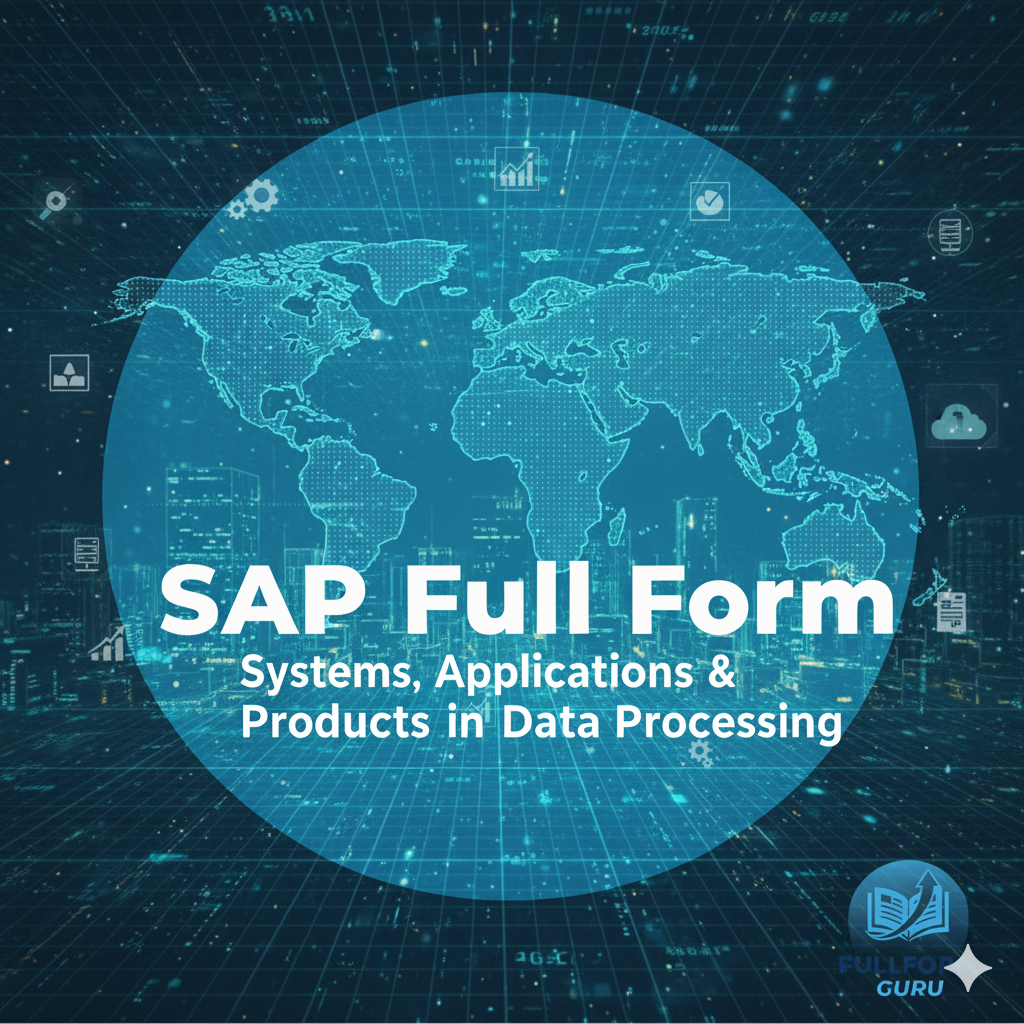
SAP Full Form: Meaning, Modules, How SAP Works, and Career Opportunities
Introduction
The SAP Full form is Systems, Applications, and Products in Data Processing. SAP is a leading enterprise software platform used by businesses worldwide to manage operations, human resources, supply chains, and customer relationships. As an enterprise resource planning (ERP) system, SAP integrates multiple business functions into a single platform, enhancing efficiency, data accuracy, and decision-making. Knowing the SAP Full Form helps explain how SAP combines different business tasks on a single platform. Whether you are a student, developer, or business manager, understanding SAP is valuable because it powers core processes at thousands of global organizations and offers strong career opportunities.
SAP Full Form and Meaning
The SAP Full form is Systems, Applications, and Products in Data Processing. Founded in 1972 in Germany, SAP began as a small software company; however, it has grown into one of the largest enterprise software providers worldwide. The term Systems, Applications, and Products reflects its purpose: to integrate different systems, provide business applications, and manage products or services efficiently. Today, SAP is best known for its ERP software, which enables organizations to streamline processes, improve productivity, and make data-driven decisions.
Role and Importance of SAP (Why It Matters)
SAP helps modern businesses by bringing various operations together on a single platform. Instead of using separate tools for human resources, supply chain, and customer service, SAP integrates them into a single system. This integration reflects the purpose behind the SAP Full Form, which is to provide systems and applications that manage products and business functions in an organized manner. It reduces errors, saves time, and improves communication across departments.
The importance of SAP also lies in its ability to handle real-time data. Businesses can track sales, manage inventory, or check employee performance instantly, which helps in making faster and smarter decisions. For global companies, SAP ensures consistency by standardizing processes across multiple locations.
SAP Modules and Implementation Stages
SAP implementation typically occurs in stages, with each module focusing on one specific business area. Understanding these helps learners and businesses know how SAP works in practice.
Here is a simple table summarizing the key stages of SAP implementation:
| Stage | Description |
| Planning | Defining goals, requirements, and resources before starting SAP setup. |
| Implementation | Installing modules like Finance, HR, or Supply Chain based on business needs. |
| Testing | Checking the system and resolving any problems. |
| Deployment | Launching SAP for day-to-day use in the organization. |
| Support & Update | Continuous monitoring, training, and upgrading for better performance. |
Each module shows how the SAP Full Form supports various business functions, from accounting to supply chain operations. Some commonly used SAP modules include SAP FI (Financial Accounting), SAP MM (Materials Management), SAP SD (Sales & Distribution), SAP HR/HCM (Human Resources), and SAP PP (Production Planning).

Eligibility & Basic Requirements
To work with SAP or build a career in SAP-related roles, you should have some basic skills and qualifications:
- Educational Background: A degree in computer science, information technology, business administration, or accounting is usually preferred.
- Basic Technical Skills: Understanding databases, programming logic, and enterprise resource planning (ERP) concepts helps.
- Analytical Skills: Ability to analyze business processes and map them to SAP solutions.
- Soft Skills, Such as communication, teamwork, and problem-solving, are essential for working with clients and colleagues.
- Access to SAP Software: For learning, you need access to SAP training systems or sandbox environments, often provided through online platforms or official SAP courses.
These requirements prepare learners and professionals to use SAP solutions effectively in real-world situations.
How SAP Works (Step-by-Step Process)
SAP is not an exam with a syllabus like traditional competitive tests, but it does follow a structured learning path. Understanding the SAP Full Form clarifies the workflow, as every stage works through a system that processes business information. To understand how SAP works, let’s break it into simple steps:
- Data Input – Users enter business data (like sales orders, invoices, HR details) into the system.
- Processing – SAP modules process this information based on predefined business rules.
- Integration – Different modules (such as sales or HR) share data seamlessly, ensuring accuracy across departments.
- Storage – Information is stored securely in databases for quick retrieval.
- Reporting – SAP generates real-time reports and dashboards to support business decision-making.
This step-by-step flow explains how SAP processes raw business information into meaningful insights for organizations.
Preparation Strategy (Practical Steps)
If you want to build skills in SAP or prepare for an SAP-related career, here are some simple and effective steps:
- Learn the Basics – Start with an overview of what SAP is and explore its main modules.
- Take Online Courses – Enroll in beginner-friendly SAP training programs to understand both theory and practice.
- Practice Regularly – Use demo versions or training software to practice your learning.
- Stay Updated – Follow SAP blogs, news, and updates since the platform evolves continuously.
- Join Communities – Engage in SAP forums or groups to learn from experienced professionals.
- Focus on One Module – Specialize in a specific area like SAP FI (Finance) or SAP HR for better career opportunities.
Following these steps ensures steady progress and builds confidence for the practical use of SAP.

Career Opportunities After SAP
SAP skills are highly valued in the job market, and learning them can open multiple career paths. Mastering the SAP Full Form and its related modules can significantly increase job opportunities in global organizations. Some roles include:
- SAP Consultant – Helping organizations implement and customize SAP systems.
- SAP Functional Analyst – Focusing on a specific module like Finance, HR, or Sales.
- SAP Technical Expert – Handling system development, coding, and technical support.
- Business Analyst – Using SAP data to improve business processes.
- Project Manager – Overseeing SAP projects and ensuring smooth execution.
- Trainer/Educator – Teaching SAP skills to new learners and professionals.
These career paths offer global opportunities as companies across industries worldwide utilize SAP.
Comparison with Other Competitive Exams
Here is a simple mini-table showing how SAP certification compares with other well-known professional exams:
| Feature | SAP Certification Exam | PMP (Project Management Professional) | CFA (Chartered Financial Analyst) | AWS Certification |
| Focus Area | Business software & ERP systems | Project management practices | Finance & investment analysis | Cloud computing & IT services |
| Exam Structure | Multiple-choice, module-based | Multiple-choice, scenario-based | Multiple levels with essays + MCQs | Multiple-choice, hands-on labs |
| Industry Demand | Global demand across industries | High in the management & IT sectors | High in the finance sector | High in IT & cloud-based firms |
| Duration to Prepare | 3–6 months per module | 6–12 months | Several years (3 levels) | 2–4 months |
| Career Growth | ERP Consultant, Analyst, Manager | Project Manager, Program Director | Investment Banker, Portfolio Manager | Cloud Engineer, Solutions Architect |
This comparison shows that while other certifications are domain-specific, SAP offers versatility across multiple industries.
How to Get Started — Practical Steps
If you are planning to pursue SAP certification, here are some simple steps to begin your journey:
- Research SAP Modules – Explore which module (Finance, HR, Supply Chain, etc.) fits your background and interests.
- Check Official Resources – Visit the official SAP website to review exam details, costs, and available learning paths.
- Enroll in Training – Join online or classroom-based SAP training programs to build practical knowledge.
- Practice with SAP Software – Use trial versions or practice systems to gain hands-on experience.
- Create a Study Schedule – Dedicate daily or weekly hours for preparation and revision.
- Join Online Communities – Participate in SAP forums and groups to exchange tips with other learners.
- Attempt Practice Tests – Take mock exams to understand the question format and to improve time management.
- Register & Appear for the Exam – Once you feel confident, register officially and appear for the certification exam.
These steps will help you start confidently and stay focused throughout your preparation.
Conclusion
In conclusion, the SAP Full Form (Systems, Applications, and Products in Data Processing) represents one of the most essential enterprise solutions used worldwide. From managing finance and supply chains to enhancing customer relationships, SAP plays a central role in digital transformation worldwide. For professionals, earning an SAP certification can open doors to global career opportunities and higher growth potential.
With the right preparation strategy, consistent practice, and focus on real-world application, anyone can succeed in this field. Whether you are a beginner or an experienced professional, investing in SAP knowledge is like investing in your future. Stay motivated, keep learning step by step, and let SAP be the bridge to your professional success.




